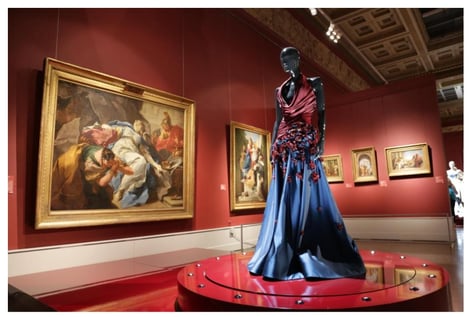
Photo caption: As our society becomes increasingly mediated, the importance of art history cannot be overstated. Image by purple_confetti from Pixabay.
Art history is more than a bunch of paintings and sculptures made by people long ago. It’s a living, breathing course of study that enriches your life in ways you can’t possibly imagine. Here’s a look at five reasons why you should study art history.
1. It Gives an In-Depth Look at the World
Pop quiz for you: How long do you think it would take you to do an in-depth study of anthropology, literature, history, sociology, theology, chemistry, geometry, engineering, physics, war and politics? Ten years if you did a couple of double majors? Longer?
While you could truly make the study of any of these subjects a lifelong pursuit, the truth is the study of art history involves all of these subjects. By studying art history, you’ve given yourself an education in the humanities, in history and politics and even STEM subjects.
Students who pursue art and art history studies in a university art program can get a bachelor’s degree in four years, but it’s possible to take up a personal study of art history, too.
In fact, although we do teach art history in the Mastery Program, we encourage our students to continue studying art history for the rest of their lives. The importance of art history can’t be overstated. It gives artists a foundation not only in art, but in life and everything that makes up life.
2. Art History Allows Us to Forge a Connection With the Past
This might seem obvious, given that art history is well, history, but studying history and feeling a connection to it are sometimes two different things.
When you study art history, you find out that the reason that some paintings, like Caravaggio’s, are dark because they’re meant to be seen in the dark. An article in Salon reminds us that when the paintings from antiquity were painted, electric lights didn’t exist. People saw paintings, like Caravaggio’s, by daylight or candlelight.
When you look at art in a context that’s closer to the one in which the painting was created, you forge a connection with the past in a much different way than just reading about that art in a book.
3. It Helps Us Orient Ourselves in the Present
The University of the People tells us why studying art history benefits us today. Our world has become very visual. Everyone has a cell phone or a tablet or a computer and those devices are filled with pictures shared from phones, video games and movies.
Knowing how to process images is going to be increasingly important as pictures start to and continue to replace text as the primary means of communication. By studying art history, you’ll understand how art tools, like a camera, intersect with society. You’ll learn how images make up society and learn how you can contribute to the conversation.
4. It Teaches You How to Integrate Information
The importance of art history can be summed up in a single word: integration. As we’ve already pointed out, when you study art history, you learn the context in which that piece was created. You also learn about the technologies of the day, or lack thereof. You gain an understanding of the sciences, literature and more.
However, to make sense of all of this is another thing all together. One of the biggest reasons why you should study art history is because it teaches you how to integrate information from disparate sources and to make sense of that information. This is a high-level thinking skill that has become increasingly important in the workplace and in life.
5. You Develop a Love for Beauty
Let’s face it. The world today is filled with some ugly images. If you look at them long enough, you start to feel discouraged and downtrodden.
But studying art history demands that you look at lots and lots of images of art, and most of them are beautiful. After doing this for a while, you realize that Pablo Picasso was right. Art really does clean the dust off the soul.
Best of all, you don’t have to take our word for it (or Picasso’s). Recent scientific studies have found that art
has an impact on brain wave patterns and emotions, the nervous system, and can actually raise serotonin levels. Art can change a person’s outlook and the way they experience the world.
In other words, looking at art makes you happy. That may just be one of the very best reasons to study art history!
Other Articles on the Importance of Art
The Top 10 Virtual Museum Tours for Fall of 2020
Art Fun Facts: 3 Times When Artists Knew More Than Scientists
5 Benefits of Drawing and Doodling You Didn’t Know About

